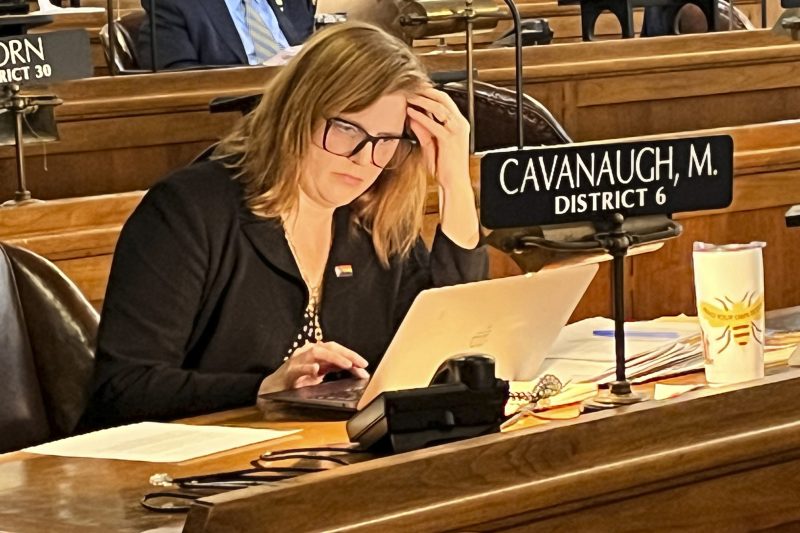A bill banning gender-affirming care for Nebraskans under 19 advanced to the second round of debate in a 30-16 vote Thursday afternoon that largely broke along party lines.
The vote to advance the bill, LB 574, was preceded by three days of contentious debate during which senators read out evocative letters from trans children and hurled accusations at each other for being insincere to their constituents and to the rest of the Senate.
“I will not give up on Nebraska’s children,” Democratic state Sen. Machaela Cavanaugh, one of the main opponents of the bill, said via Twitter, moments after it advanced. “Failure isn’t an option because, if I fail, I’m failing children, and I’m not going to fail children.”
Nebraska’s state legislature has been unable to pass a single bill this year. Cavanaugh’s distaste with the advancement of the bill, coupled with the state’s unique filibustering rules, has brought the session to a standstill.
The advancement of the bill means that Cavanaugh and other senators who oppose it will continue to filibuster for the rest of the 90-day session. To return to normal business in the chamber, proponents of LB 574 need to muster 33 votes to stop Cavanaugh from filibustering every bill.
While filibustering is not rare for Nebraska’s Unicameral legislature, Cavanaugh is the first lawmaker to filibuster every bill introduced to the floor, said lawmakers and political scientists. Traditionally, senators have only stalled debate around the bills they oppose.
If the filibuster does not end, the clerk of the legislature predicted, as few as 30 bills out of the roughly 820 that were introduced would be debated this session. Senators opposing the bill seeking to restrict gender-affirming care say this is the first time their legislature has become a part of the national culture war around transgender rights. Lawmakers also say the bill and the filibuster are a sign that one of the least-polarized legislatures in the country is becoming partisan.
“This bill legislates hate and targets trans youth,” Cavanaugh told The Washington Post. “Legislating hate is not our job. Our job is to protect our children from the harm this bill could cause them.”
She has defined her own priorities clearly. “I will burn this session to the ground over this bill,” she told the body last month. “I have nothing but time, and I am going to use all of it.”
After three weeks of the filibuster, Cavanaugh and Speaker John Arch had come to an agreement March 16. She will take a pause from the filibuster for one afternoon, and he will schedule the debate for LB574, the bill she is opposing, for March 21, when the legislature comes back from a four-day recess.
The bill, sponsored by Sen. Kathleen Kauth, a Republican, was advanced by the Health and Human Services Committee to the floor for debate the same day as a bill proposing a ban on abortion. LB574 would forbid gender-affirming care such as puberty blockers, hormone therapy and surgeries for those under 19.
Utah, Mississippi, Alabama, Arkansas, South Dakota, Kentucky and Tennessee have passed legislation restricting minors seeking gender-affirming care. Governors in Utah, Tennessee and South Dakota have signed the measures into law. In Florida, the state’s board of medicine has imposed similar limits on minors, and the state no longer allows Medicaid to cover it for anyone, regardless of age.
Cavanaugh doesn’t want Nebraska to join those states. She began filibustering late last month, soon after the bill advanced to the Senate floor.
“Filibustering is part of our system. We are all resigned to what Senator Machaela Cavanaugh is doing,” Kauth told The Post. “We are finding ways around it; we are ready to have debates all night to get things done.”
Nebraska has a single-chamber legislature: There is no House, only a 49-member Senate, which comprises 32 registered Republicans and 17 registered Democrats. Part of the chamber’s uniqueness is that, while it takes only a simple majority to pass a bill, it needs 33 votes to break a filibuster.
Those supporting LB574 do not have 33 supporters, Democratic lawmakers had said before the bill advanced.
Cavanaugh said that while her filibuster is stalling legislative debate on the abortion bill, as well as at least five other bills surrounding the rights of transgender youths, her main priority is to ensure that LB574 does not pass.
“The dream would be for the bill to die and for us to move forward with the work of the state,” she said, pointing to bills about the budget and child-care subsidies.
Previously, Cavanaugh has sponsored bills that sought to provide free meals to all students in Nebraska public schools and keep infants with their incarcerated mothers whenever possible. She said she also views the fight against LB574 as an effort to safeguard adolescents.
“Nothing is more important to me than protecting our children,” she said. She added that she fears seeing trans youths hurt by their own government and families opting to leave the state rather than deal with LB574 as law.
Arch said he expects that fewer bills will be passed this year because of the filibuster. Apart from passing the budget, “this session we will tackle issues of taxes, prioritization of excess revenues and school funding,” he said.
The mood of the legislature is varied, said Brandon Metzler, the clerk of the legislature. “Some people are annoyed, others indifferent, and some accepting of the filibuster,” he said. “It depends on their relationship with Senator Cavanaugh.”
Cavanaugh’s fellow Democrats blame Republicans for bringing the culture war to their normally bipartisan state assembly.
“Until this year, we had never faced anti-gay bills, or bathroom bills, or bills banning gender-affirming care,” said state Sen. Megan Hunt, a Democrat who is serving her second term. “The legislature had never even debated a bill about banning abortion till last year.”
Hunt and Cavanaugh said their constituents support the filibuster even though it means stalling governance.
“People have offered all kinds of help, from dropping off food to child care while Senator Cavanaugh filibusters,” Hunt said. “This is because Nebraskans do not want a law banning gender-affirming care.”
Kauth, who proposed the bill, told The Post that she campaigned, and won, on issues surrounding gender identity.
“When I was going door to door, constituents told me they are very concerned about biological boys being allowed in girls’ locker rooms and with doctors rushing children to transition,” she said. “These issues are more prevalent than people assume.”
She said that her bill is meant to protect children from gender-affirming care that they might regret later in life.
The American Medical Association, the American Psychological Association, the Endocrine Society and other major medical organizations oppose restrictions on gender-affirming care. The American Academy of Pediatrics released a statement in August that called such care “medically necessary and appropriate” for some minors.
Hunt said that while the filibuster is a reaction to anti-LGBTQ bills being introduced in Nebraska, it is also a product of the current legislature’s inexperience and weak leadership. She said it’s the speaker’s job to show leadership and to maintain the nonpartisan culture of the body.
“This culture war stuff is coming from the newer senators,” she said. “They need mentorship.”
Political scientists agree that Nebraska’s history of maintaining a nonpartisan legislature may be changing.
The legislature, called the Unicameral in Nebraska, used to be one of the least polarized in the country, said Geoff Lorenz, a political scientist from the University of Nebraska at Lincoln, but that changed with the introduction of term limits for senators, as the old guard retired.
“Over the last two decades, the Unicam has been among the most rapidly polarizing state legislative chambers in the country,” he said.
Lawmakers in Nebraska have successfully used filibusters to burn floor time, delay votes and have bills thrown out of the body. Conservatives have previously used them to delay votes on Medicaid expansion, and Democrats have run out the clock on a bill allowing people to carry concealed guns without a permit.
Cavanaugh said she learned a lot about filibustering from Ernie Chambers, a left-leaning independent and former senator who ended his second term in 2021 and was widely known for a masterful filibuster.
“He was my tutor, but I am taking it in my own direction,” said Cavanaugh. “Unlike his focused technique, I am filibustering everything, everyday, no matter what.”



























